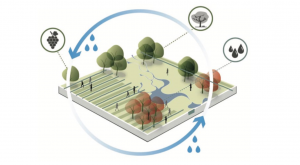The Mashreq region is part of the most water scarce region in the world and both urban and rural areas face water challenges. However, some urban areas, especially in Lebanon and Jordan, experience extreme pressure on water availability, both in quantity and quality, exacerbated by climate change, the unprecedented influx of Displaced Persons (DPs) especially from Syria, and groundwater over extraction and pollution challenges.
The overall aim of this project is to better respond to climate change impacts and vulnerabilities in the context of the Syrian crisis in Jordan and Lebanon. This is done by demonstrating what concrete adaptation measures respond to the needs of both DPs and host communities, and especially women and youth, while avoiding any tension over resources and employment opportunities.
The project will focus on responding to climate change-related water challenges by taking a sustainable water management approach. This means it aims to reduce the demand of unsustainable water sources such as over-extracted (and often polluted) groundwater, while increasing water supply options from non- conventional and more sustainable sources, including, rainwater harvesting and the reuse of treated waste water.
The anticipated impact of the project is estimated at 930 beneficiaries for component 1, 101,588 for component 2, 157,309 for component 3 and 600 for component 4. Approximately one fourth of the target population is Syrian. Targets for women and youth are set at 40 percent for women and 15 percent for youth. Because there is some overlap with beneficiaries between component 2 and 3, the total number of project direct beneficiaries is estimated at around 120,000.
| Project Component 1: Increasing the resilience of municipal governments: Manage urban risks and vulnerabilities in the context of climate change, esp. water scarcity challenges, and urban (population) growth, incl. from Displaced Persons (DPs) migration | US$
1,341,000 |
| Project Component 2: Increasing the resilience of citizens (DPs and host communities): Improve awareness, ownership and capacities to respond to climate change, incl. to operate, maintain and replicate resilient water harvesting, supply and irrigation systems | US$
1,881,671 |
| Project Component 3: Increasing the adaptive capacity of the water sector: Expand unconventional water harvesting, supply and irrigation options, using innovative and replicable techniques suitable for the context | US$
7,509,767 |
| Project Component 4: Improving knowledge and policies and regulations to increase urban resilience in the region: Project KM and replication, incl. development of regional urban risks and vulnerabilities management model in the context of climate change and urban (population) growth (incl. from DPs migration) | US$
923,162 |
| Project execution cost | US$ 1,223,210 |
| Total project cost | US$
12,878,810 |
| UN-Habitat management fee | US$
1,094,699 |
| Grant Amount | US$
13,973,509 |
Project Documents
| Attachment | Type | Size |
|---|---|---|
| Project pre-concept | 812 KB | |
| Project document | 8 MB | |
| PPR1 (for web) | XLSX | 222 KB |
| PPR2 (for web) | 136 KB |


